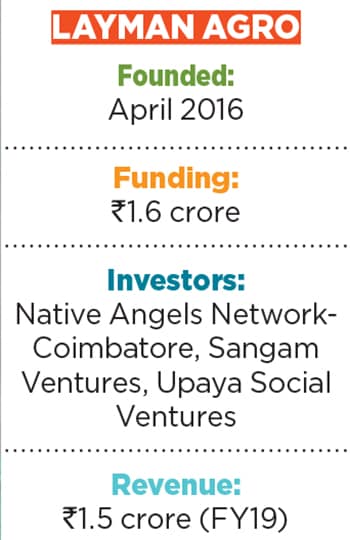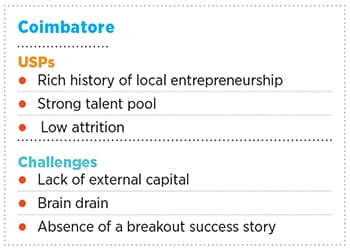Building a business ecosystem in Coimbatore
A traditional business environment and realistic entrepreneurial outlook have helped in building a startup ecosystem in Coimbatore


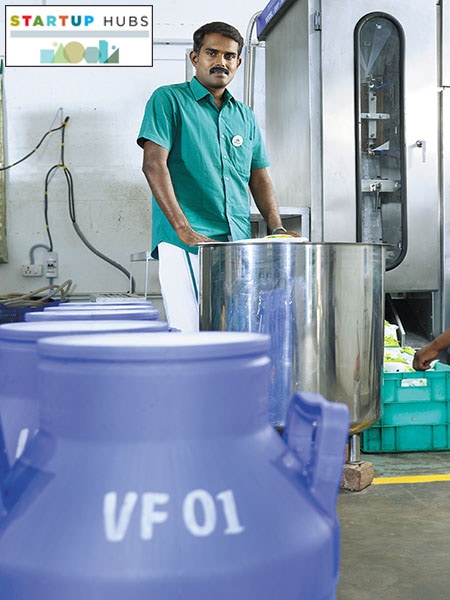 Selvakumar Varadharajan, founder, Layman Agro
Selvakumar Varadharajan, founder, Layman Agro
Image: C P Shanmugham for Forbes India[br]Eight years in Bengaluru until 2013 gave Selvakumar Varadharajan, 38, almost everything: Career, money, exposure to a cosmopolitan society, and the blues. The bling was blinding.
Renouncing a big city life would have taken longer had this humbling realisation not dawned upon him. “For people from smaller towns, with degrees from mediocre colleges, the growth is slow. The big cities, despite all their advantages, are for people with big academic and financial backgrounds. My thought was, let’s get back and grow with a growing city,” says Varadharajan, who quit his job as a college lecturer in 2013 and returned to the familiar terrains of Coimbatore, a city where his wife and he went to college.
Varadharajan, who grew up in Thammampatti, a town in Tamil Nadu’s Salem district, worked with a couple of educational institutions for the next three years before launching a farm-to-home dairy company, Layman Agro Ventures, which predominantly sells fresh milk and dairy products under the VilFresh brand. VilFresh, says Varadharajan, is unlike other new consumer brands to have hit the shelves in Bengaluru, Delhi or Mumbai. It’s a venture that doesn’t turn the basic tenets of running a business—sustainable growth and profitability—on their head, thanks to paucity of venture capital (VC) funding, a bane of being in a city like Coimbatore. “What if the fund doesn’t come? This threat always remains in small cities. So, the business is more bottomline-focussed than topline,” says Varadharajan.
That fear has been allayed. Earlier this year, Layman Agro snared ₹1.6 crore in angel funding from the Coimbatore chapter of the Native Angels Network, Sangam Ventures and Upaya Social Ventures.
Varadharajan runs a tight ship, sans any ostentation, reflective of the lives of two crucial stakeholders in his business—the rural youth chasing a decent wage, and the often-short-changed farmers.Seated on a rug spread across the floor of his non-air-conditioned office—an austere setup with a work desk and a cupboard—at Sivanandhapuram, a 20-minute drive from the airport, Varadharajan outlines his vision for Layman Agro. “I wanted to solve the problem of my wife, who is an urban consumer, in the best interest of my grandfather, who is a farmer, by empowering a rural youth, who is my cousin.”
Essentially, Layman Agro procures agricultural inputs from manufacturers in bulk at a low cost, sells them to the farmers cheaper than the retail price and procures milk and staples from them at a price higher than what the farmers get from wholesalers.
Farmers save on inputs and get a premium for the produce. The rural youth, Layman’s employees in charge of the supply chain, earn a handsome five-figure monthly salary that could potentially dissuade them from harbouring big city ambitions. And the consumer gets fresh produce.
Varadharajan and his team of 30-odd employees have started making inroads in a market dominated by legacy brands such as Avin, Thirumala, Heritage, Hatsun Agro and Dodla Dairy. The company is poised to clock at least ₹2.5 crore in FY20 revenues, a 65 percent year-on-year growth.
“We deliver milk within three hours of milking the cow. We don’t chill the milk. We even mention the time of packaging,” says Varadharajan.
Varadharajan plans to increase capacity through captive contract manufacturing units run by potential partners, on a revenue sharing basis. Plans are afoot to tap into home makers deft at churning out food products, for instance pickle, and sell the produce under the VilFresh brand, albeit with a one-line attribution to the makers.
Promoting “micro-entrepreneurs” is Varadharajan’s way of “giving back”, a virtue practised by Coimbatore’s yesteryear entrepreneurs and still extolled by the city’s populace. Coimbatore is home to numerous stalwarts in textiles and manufacturing such as T Stanes & Company, Sakthi Group, Sri Varadharaja Mills, Lakshmi Machine Works, the KG Group, Pricol, CRI Pumps and the PSG Group among others, which flourished in the pre-liberalisation era. Information technology bigwigs such as Skava (acquired by Infosys in 2015 for $120 million) and Payoda were also started here.“Coimbatore has a legacy of spirited entrepreneurs who did a lot for the city. They brought water from Siruvani river in Kerala. They set up some of the city’s best educational institutes like the PSG group of schools and colleges or the Coimbatore Institute of Technology. They set up the medical infrastructure.There is a social aspect to entrepreneurship here,” says Andrew Sam, founder of Simplicity, a Coimbatore-focussed news website that claims 7 lakh daily unique visitors.
Says K Suresh Kumar, executive director of the science and technology entrepreneurial park at the PSG College of Technology, which has incubated at least 200 startups since inception in 1998, “Even Coimbatore’s quest to position itself as a destination for knowledge-based industries like IT and biotech was led by local industrialists at a time when nobody from Coimbatore had IT companies. The Tidel Park here is a good example of their effort to set the stage for new industries.”
Varadharajan perhaps harbours a similar ethos. Ask him if he would have been better off in a bigger city and pat comes the reply, “You will possibly not find this kind of a business environment there.”
*****
Sanath Kumar, 24, dropped out of his engineering course at the PSG College of Technology in the third year with a fire in his belly. His Internet of Things startup, Smitch, would take India and then the world by storm, he thought.
A college professor connected Kumar with a local high net worth individual (HNI), who readily signed off on a loan of ₹70 lakh. It seemed like a smooth sail, but the halcyon days didn’t last long. “I made a big mistake,” he says.
Sometime in 2017, Kumar, in a haste to launch the company’s first product, a smart switch, ploughed about ₹30 lakh into manufacturing 2,000 pieces of the device. During a quality check just before the batch was to be dispatched for sale, it emerged that the switches were faulty.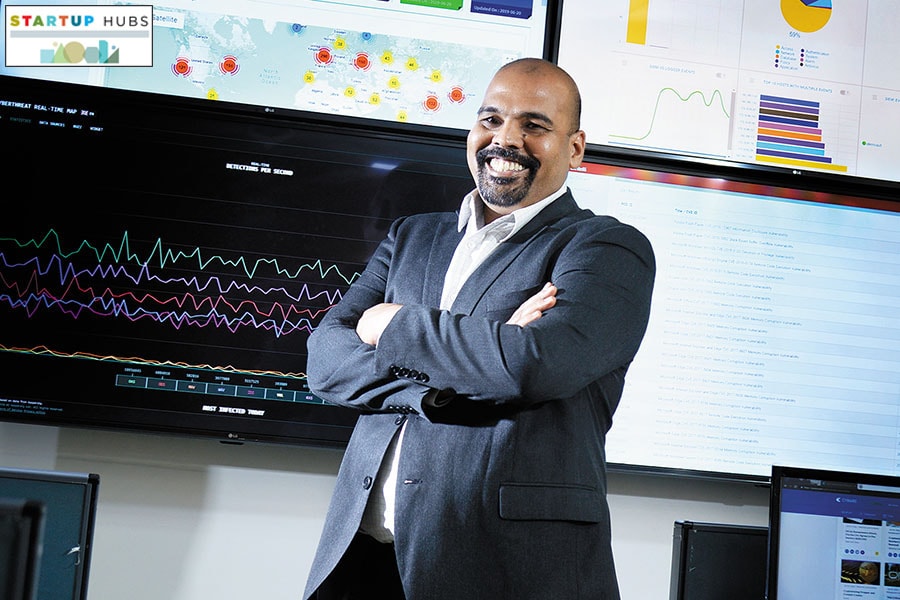 Pradeep Menon, Founder, Lakshya Labs
Pradeep Menon, Founder, Lakshya Labs
Image: C P Shanmugham for Forbes India[br]Kumar had sunk more than a third of his corpus into a black hole. The company was constrained to shrink its workforce of 28 by half. “Things came to standstill,” he says.
Pragadheesh Raj, co-founder and chief technology officer at Smitch, and Kumar redesigned the product and packed off a few batches to some local architects and interior designers for testing. Arun Kirki was one among them. After about a month of association with Kirki, a self-made businessman himself, Kumar poured his heart out. “I told him I was in dire straits.”
A few days later, Kirki wrote Kumar a cheque of nearly ₹25 lakh without any precondition on repaying the loan. “I am what I am because of him. His thought was that he was in a similar situation long ago, and somebody helped him back then. It was his turn now,” says Kumar. “If you are in Coimbatore building something different, especially in hardware, the ecosystem rallies behind you.”
Kumar hasn’t looked back since. The initial loan has been repaid and the firm has mopped up half a million dollars from LetsVenture. Kirki has equity in the company.
Today, Smitch sells an array of smart bulbs, switches and plugs among others, exclusively on Flipkart. Since partnering with Flipkart late last year, the company has sold products worth about ₹2 crore and is on track to rake in ₹16 crore in revenue this fiscal. “We sell 30,000 bulbs daily,” says Kumar.
“We are building a Smitch platform where devices from multiple brands can interoperate. Some years from now, when a household will have several smart devices, the Smitch app can become a single platform on which all such devices can be controlled.” The company has already partnered with 27 brands, including Chinese OEM Tuya, Philips, Bose and Logitech. The goal is to become ubiquitous, assimilate data and sell services based on insights.
“The good thing about Coimbatore is that there are no startup jargons. There aren’t many coffee shops and pubs as is the case with some of the big cities. Even if you find one, it is unlikely that the conversation will be around the next big startup idea. It is a traditional work environment which was good for me because I learnt the fundamentals of business the right way,” says Kumar.
Dhruv Suyamprakasam, founder of telemedicine startup iCliniq, agrees. In 2012, when he was ideating iCliniq, Suyaprakasam landed up in Bengaluru—India’s startup capital. Like most budding entrepreneurs, he spent time hanging out with the “startup folks” in the coffee shops of Koramangla and HSR Layout.
Unimpressed, he moved back to Coimbatore in a couple of months. The noise around startups was deafening. “Bengaluru was all about scaling fast and replicating successful business models in the US. There was a lot of peer pressure to grow fast,” he says.
Suryaprakasam even launched online appointment booking under iCliniq, egged on by entrepreneurs in his peer group, only to shut down the vertical in a matter of months. “That (online appointment) is not something that I set out to do. Had I continued there [in Bengaluru], I would have literally shut shop.”
Today, the bootstrapped iCliniq is among Coimbatore’s successful consumer internet startups, facilitating about 900 consultations every day with a pool of 3,500 doctors. About three-fourth of its business comes from outside India, he says. “Honestly, I reinvented myself after moving back.”
It is not just the local boys coming home. Even professionals with prolonged stints abroad have landed in Coimbatore to start new businesses. Hemalatha Annamalai, who worked in Singapore before landing in Coimbatore to launch electric vehicle company Ampere Vehicles, a business that was sold to Greaves Cotton last year, is a case in point. So is Pradeep Menon, who had earlier run businesses in the UAE and the US and set up Lakshya Cyber Security Labs in Coimbatore in 2015. Menon sold Lakshya to Danish firm Zacco earlier this year.
“There are a lot of top notch educational institutions here. So, a lot of talent is available, at least at the entry level. There is a cost advantage as well in entry-level hiring, to the extent of about 50 percent as against some of the bigger cities. And attrition is relatively low,” says Menon. “On the other hand, attracting experienced people is a challenge even if you are willing to pay on a par with bigger cities.”
*****
Lack of patient capital is a major drawback, despite the city estimated to being home to at least 400 HNIs worth at least ₹100 crore. Coimbatore also falls in the blind side of VC firms.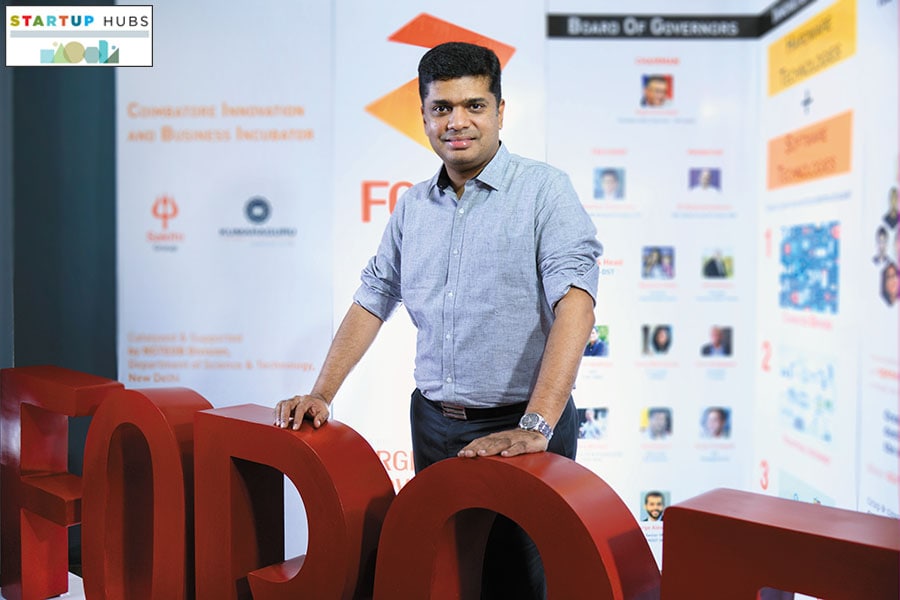 Shankar Vanavarayar, founder, Forge Accelerator
Shankar Vanavarayar, founder, Forge Accelerator
Image: C P Shanmugham for Forbes India[br]Perhaps the rich history of legacy businesses has come back to haunt Coimbatore. While the affluent populace is comfortable investing in traditional businesses—manufacturing, foundries, textiles etc— there aren’t many takers for startups. Angel investments in the city are mostly loans. Buying equity in businesses with no clear path to profitability is an alien concept here. The lure of valuations don’t sway investor sentiments while fledgling startups hesitate to borrow as there isn’t any clear road map for revenue generation, hence, repayment.
Says Kousik Rajendran, founder of curated travel portal Byway, “In Coimbatore, when it comes to startups, the template is not clearly understood, especially since consumer internet startups take at least 5-7 years to mature and generate returns.”
The scenario is changing, albeit slowly, with the younger scions of legacy businesses getting involved in emerging models.
Like Shankar Vanavarayar of the Sakthi Group. Besides his day job at the family business, Vanavarayar is entrenched in the operations of the Kumaraguru College of Technology, run by his family. He is also an investor in Byway and the founder of Forge, a hardware-focussed startup accelerator.
“We are entering a new zone. Textile, engineering, etc are comfort zones. We still have that hangover, but things will change. The younger generations have just started,” says Vanavarayar.
Local investors are also learning the tricks of the trade. Says Jayaram Govindrajan, chairman of the Coimbatore chapter of Native Angels Network, “When we started, people said let us throw money. We were looking at small ticket sizes. The first year was something like that and then we stopped it in six months.”
It was a lesson learnt the hard way. “We did two such deals and realised that these entrepreneur were taking money to do whatever they had to do. There was no fire in them. Also, from our end there was no board representation or proper process,” he says. The focus is to mentor startups until they become “investible” and not rush to write a cheque.
It is still a while before Coimbatore catches on to Bengaluru, Delhi or Mumbai. Says Sam of Simplicity, “Coimbatore is waiting for its own success story—a startup valued at least ₹100 crore. The startup scene is buzzing, but, there are no breakouts yet.”
First Published: Jul 12, 2019, 07:34
Subscribe Now